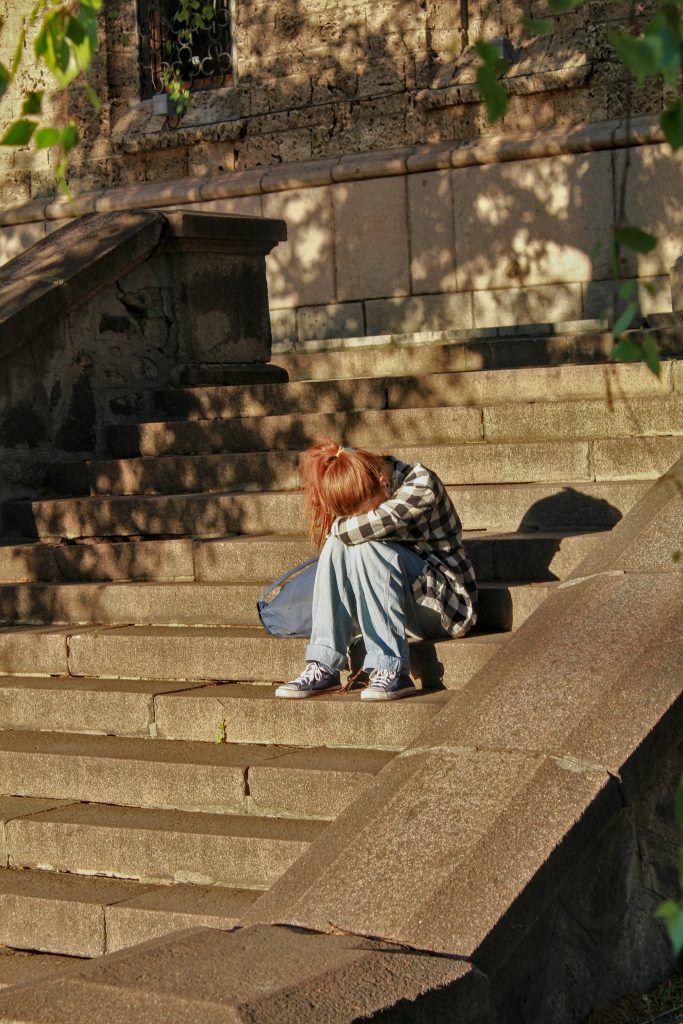Social situations are often avoided by teenagers with social anxiety under the assumption that they are not capable of handling them well. But is this assumption correct?
Here we go again. Your teenager’s extroverted friend wants to drag them to a party. Social situations make them anxious, and they tell you, “But I’m not good at socializing!” This is the typical thought process of a socially anxious person before any social event. They are also often afraid of being negatively judged, embarrassing themselves, or completely failing in interactions with others. Therefore, instead of facing social situations, they choose to avoid them. But is it really true that they do worse in social situations than other people?
Is recognizing others’ emotions the key to connection?
“Is the other person laughing? No, that’s not a smile but a frown? Oh, are they yawning now? Am I boring them?” Correctly recognizing others’ emotions helps us interact smoothly with each other [1]. The interaction between two people thus begins with reading each other’s faces. It is precisely this recognition of emotions that is believed to be lacking in socially anxious people. So, one might wonder whether the fear of awkward interactions is justified by their lack of emotion recognition? Research shows that this is not exactly the case and that socially anxious people can recognize emotions just as well as others [2]. If socially anxious individuals possess this important skill that helps interacting smoothly with others, why do they think they are not so good at it?
Not emotion recognition but self-assessment
Searching the internet for ‘self-confidence quotes’ brings up many texts that all essentially say that self-confidence leads to a happy life. Science also often describes self-confidence as ‘self-assessment.’ In other words, this is an ability to correctly judge own behavior and thoughts and have trust in them. This also ensures that a person can regulate and adjust own behavior and thoughts well. Self-assessment also plays an important role in our mental health. To illustrate, imagine this negative cycle. An individual with lower self-confidence will believe they are not able to do something (in our case, socialize) which may, in itself, lead to a worsened performance. This negative experience further decreases their self-confidence and may exacerbate anxiety. Self-assessment thus maintains self-confidence, and negative self-assessment may decrease self-confidence [3].
Answer from science
People with social anxiety might have less confidence in their abilities even though they perform just as well in social interactions as non-socially anxious people. We put this idea to the test ourselves in a research study that has recently been published [4]. Our research question was: Are socially anxious students lacking skills to recognize others’ emotions, or do they have lower confidence in their own performance? With this, we wanted to better understand why socially anxious people may avoid social situations. Participants were shown videos of other people displaying emotions (e.g., happiness, sadness, etc.) and were asked if they could correctly label the displayed emotions. For example, a video in which someone laughs would be labeled as happiness. Then, they were asked about their level of confidence in their own answer. We discovered, in line with other studies, that socially anxious people can recognize emotions just as well as non-socially anxious people but have less confidence in their ability to do so.

Socializing is knowing that you can socialize
It is known that recognizing emotions plays an important role in smooth social interactions [1]. The lack of confidence in the ability to recognize others’ emotions can contribute to a negative view of social interactions. In other words, socially anxious people can accurately recognize emotions, even though their reduced self-confidence and high self-criticism might make them believe they can’t. This often leads them to avoid social situations. As the famous psychologist Albert Bandura once said, “Many of the people who seek help are not incompetent or inhibited by their anxiety, but they experience a lot of distress due to too high expectations for their self-assessment.” In other words, if people place too high expectations on themselves and are too critical of themselves in social situations, it is very likely that they will experience social anxiety. It is, thus, not the matter of lacking skills, rather, it is not believing in own capabilities to handle a social situation that makes teenagers stressed about socializing.
What you, as a parent of a socially anxious teenager, can do?
Whereas many factors, from genetic predisposition to the experiences in school and with peers may influence teenager social anxiety, parents also play an important role in their teenager’s life and can make a difference when it comes to teenagers’ social anxiety. For example, research shows that teenagers who perceive their parents as using shaming or criticizing them in their conversations with them are more socially anxious [5,6]. Therefore, shaming and criticizing teenagers for their social behaviors, even when done with best intention of provoking a positive change, may put teenagers under a lot of pressure in social situations. What can work better? Past studies have shown that parents who use open and honest communication with their teenagers, who show support and warmth, connect with their teenager, as well as use humor and promote teenager’s autonomy have kids who show lower levels of social anxiety [7,8]. So next time, when you discuss your teenagers’ mishaps or failures, try not to shame them. Instead, talk openly about what happened, accept your teenagers’ anxious feelings, and, if appropriate, use humor and allow for your anxious teenager to realize that no one is perfect and that anyone can make mistakes in social situations. If you, however, notice that the feelings of anxiety are so strong that they impair the daily functioning of your teenager, do not hesitate to ask for help. There are many available treatments that are effective for teenager social anxiety problems.
This blog was translated by the author from here
References
- Keltner, D. & Kring, A. M. Emotion, social function, and psychopathology. Review of General Psychology 2, 320–342 (1998).
- Hunter, L. R., Buckner, J. D. & Schimdt, N. B. Interpreting facial expressions: The influence of social anxiety, emotional valence, and race. Journal of Anxiety Disorders, 23, 1–7 (2009).
- Wong, Q. J., & Rapee, R. M. (2016). The aetiology and maintenance of social anxiety disorder: A synthesis of complementary theoretical models and formulation of a new integrated model. Journal of Affective Disorders, 203, 84-100.
- Folz, J., Akdağ, R., Nikolić, M., van Steenbergen, H., & Kret, M. E. (2023). Facial mimicry and metacognitive judgments in emotion recognition are distinctly modulated by social anxiety and autistic traits. Scientific Reports, 13(1), 9730.
- Fisak Jr, B., & Mann, A. (2010). The relation between parent rearing practices and adolescent social anxiety: A factor analytic approach. International Journal of Adolescence and Youth, 15(4), 303-317.
- Gulley, L. D., Oppenheimer, C. W., & Hankin, B. L. (2014). Associations among negative parenting, attention bias to anger, and social anxiety among youth. Developmental Psychology, 50(2), 577.
- Gómez-Ortiz, O., Romera, E. M., Jiménez-Castillejo, R., Ortega-Ruiz, R., & García-López, L. J. (2019). Parenting practices and adolescent social anxiety: A direct or indirect relationship?. International Journal of Clinical and Health Psychology, 19(2), 124-133.
- Van Zalk, N., & Van Zalk, M. (2015). The importance of perceived care and connectedness with friends and parents for adolescent social anxiety. Journal of Personality, 83(3), 346-360.




